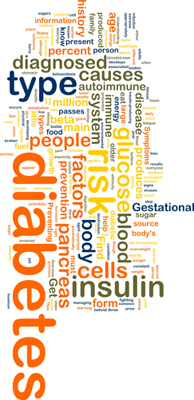Diabetes
 Diabetes is a long-term (chronic) condition caused by too much glucose (sugar) in the blood. It is also known as diabetes mellitus. There are two types of diabetes - type 1 and type 2.
Diabetes is a long-term (chronic) condition caused by too much glucose (sugar) in the blood. It is also known as diabetes mellitus. There are two types of diabetes - type 1 and type 2.
According to the charity Diabetes UK, more than two million people in the UK have the condition and up to 750,000 more are believed to have it without realising they do.
More than three-quarters of people with diabetes have type 2 diabetes mellitus. This used to be known as non-insulin dependent diabetes mellitus (NIDDM) or maturity-onset diabetes mellitus. The number of people with type 2 diabetes is rapidly increasing as it commoner in the overweight and obese, which is itself a growing problem.
The remainder have type 1 diabetes mellitus, which used to be known as insulin-dependent diabetes mellitus.
What's the treatment for diabetes?
It's recognised that the sooner the blood sugar levels are brought under control, the better the long term prospects of preventing damage. Lifestyle advice about diet, weight management and regular activity is the first step.
Type 1 diabetes will require immediate insulin therapy, Type 2 diabetes will first be managed with a drug called Metformin, if lifestyle changes alone aren't effective. There are now several other drugs used in type 2 diabetes, although eventually some type 2 diabetics will need insulin therapy as it's a progressive disease
Diabetes UK - How to take a blood glucose test
There is further information and education on the Diabetes UK Video Site
Useful Links
Diabetes - Healthtalkonline
 Healthtalkonline, an award-winning charity website, lets you share in other people's experiences of health and illness. An excellent resource compiled after interviewing a wide range of people suffering from heart disease.
Healthtalkonline, an award-winning charity website, lets you share in other people's experiences of health and illness. An excellent resource compiled after interviewing a wide range of people suffering from heart disease.
Type 1 Diabetes
An excellent resource with useful information and references relating to Type 1 Diabetes.
Type 2 Diabetes
A useful resource regarding Type 2 Diabetes. 
Diabetes UK
Largest charity in the UK devoted to the care and treatment of people with diabetes in order to improve the quality of life for people with the condition
NHS Choices
Further information about symptoms, treatment, causes and prevention of Diabetes
Duncan Street Primary Care Centre Reducing Your Risk of Diabetes |
Reduce Your Risk of Diabetes
Thank you for finding out your diabetic risk score. As you can see, the risk score has shown that you are at increased risk of diabetes, but the good news is that you haven’t got diabetes and there are a number of steps you can take to stop yourself developing it.
We can’t alter some of the risk factors for diabetes and pre-diabetes , for example
· our age (diabetes is more common the older we are)
· our family history
· our ethnic origin, (diabetes in more common in people of Black and South Asian origin.)
But there are other factors that we can alter.
· The Diabetes Prevention Programme showed that losing just 5-7% of your body weight, eating more healthily and exercising prevents or delays diabetes by nearly 60%.
· Also you are never too old to make these changes, people age 60 or over reduced their chance or developing diabetes by 70% by carrying out these changes.
· Try and increase your walking. Walking 30 minutes a day, five days a week can decrease your risk.
· One study showed that people who used a pedometer to track their step count halved their risk of developing diabetes. You don’t have to achieve the magic 10,000 steps either, check your baseline steps over a few days and then aim to increase this by 2,000.
· Also don’t spend too much time sitting down. It has been shown that if you have a sedentary job you are more likely to develop diabetes. So get up every hour and move round.
· Start eating foods that have a low glycaemic index. (This means they are absorbed more slowly by the body. Some simple food swaps will help you do this.
· Swap white bread for whole grain.
· White rice for basmati.
· Mashed potatoes for new potatoes.
· Cereals like corn flakes for porridge or bran flakes.
· Cut down on meat and use beans or lentils to bulk up stews..(This can also help lower cholesterol.)
· Eat at least 5 portions of fruit and vegetables. (more if you can.)
· Reduce your fat intake and eat regular meals as this helps to keep blood sugar levels stable.
Putting these simple steps into action will help prevent or delay diabetes.
If you need any more advice please speak to one of the doctors or nurses who will also advise you when you should have your blood sugar tested again.
These links all come from trusted resources but if you are unsure about these or any other medical matters please contact your doctor or pharmacist for advice.